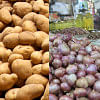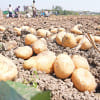It's peak season for potato, but prices are still high. Here’s why

Consumers in Bangladesh have been paying more for potatoes since the beginning of the season after inclement weather alongside the stoppage of imports disrupted the supply of the tuber.
Traders said potato production in the country was affected due to incessant rains during Cyclone Michaung, which led to lower supply of early varieties of potatoes at the beginning of the peak season. They added that the stoppage of potato imports had also led to a reduction in supply.
As a result, consumers now have to buy potatoes at an abnormal price.
Yesterday, potatoes were being sold at Tk 50 to Tk 60 per kilogramme (kg) compared to Tk 22 to Tk 25 per kg a year ago, data from the Trading Corporation of Bangladesh showed.
In the last month, the retail price of potatoes has increased by 10 percent while it has increased by 134 percent in the past year, the data showed.
Mohammad Sabuj, a wholesale trader in Karwan Bazar, one of the largest kitchen markets in Dhaka, said prices usually start to fall when new potatoes arrive in the market, but this time was an exception.
New potatoes are entering the market while old potatoes are also in stock, but prices are rising instead of falling, he said.
He added that around this time last year, he was selling potatoes for Tk 18 to Tk 20 per kg. Now, he is selling each kg at Tk 45 to Tk 46.
Sabuj, who has been trading potatoes for 30 years, said he had never seen prices increase to this extent at the beginning of the season.
Jahirul Islam, a farmer of the Khetlal Upazila of Joypurhat district, said: "Last year, we produced 70-80 maunds of potatoes per bigha. This year, we can manage only 40-42 maunds per bigha because unfavourable weather spoiled saplings. That's why production is lower this year."
Bangladesh Bureau of Statistics data shows that the average wholesale price of each kg of potatoes was Tk 19.63 in 2018, Tk 20.46 in 2019 and Tk 19.58 in 2020.
Mostafa Azad Chowdhury Babu, president of the Bangladesh Cold Storage Association, said last year's stock of potatoes in cold storage facilities had been exhausted before December last year. As a result, cold storage facilities are not supplying any potatoes to the market at present.
He said that potato production had fallen behind demand this season as around 80 lakh metric tonnes were produced against a demand of 90 lakh. As a result, there are concerns about low potato storage in cold storage facilities.
He added that the cyclone had also delayed the planting of new potatoes, saying the potatoes available in the market now were immature. He also opined that because farmers were getting higher prices, they were selling potatoes at 35-40 taka per kg, he said.
The price of potatoes suddenly started increasing around September last year. To control the market, the government fixed the retail price of potatoes at Tk 35-36 per kg.
However, that measure did not pan out and so, on October 30 last year, the government permitted the import of potatoes until December 15. But even that had little impact on the market, with prices per kg not falling below Tk 50.
According to the Department of Agricultural Extension, the government had given permission to import 3.6 lakh tonnes of potatoes, but only 60,000 tonnes arrived.
According to the Bangladesh Cold Storage Association, total production did not exceed 85 lakh tonnes last year although the Department of Agricultural Extension estimated it to be 1.12 crore tonnes.
ABM Mizanul Hoq, Agriculture Marketing Officer (In Charge) of Munshiganj district, one of the country's major potato-producing hubs, said: "Potato cultivation this year has been damaged due to cyclones, leading to inadequate potato supply in the market."
Potato prices have risen sharply in Munshiganj due to low supply this season, he said, adding that prices had nearly doubled compared to last year, with new potatoes being sold for around Tk 55 per kg.
"Last year, potato cultivation was affected as huge losses were incurred due to excessive rainfall caused by two cyclones. Due to this, potato production declined," said Hanif Mridha, a wholesale potato seller at Munshirhat Bazar, the potato market in Munshiganj.
Badal Chandra Biswas, director general of the Department of Agricultural Extension of Munsiganj district, said the arrival of new potatoes in the market had been delayed by a couple of weeks due to rain just before the start of the season.
Due to this, a gap has been created between demand and supply. But he stressed that there was no shortage of production.
He added that there was a trend of maximising profits at the primary, secondary and tertiary sectors because of which consumers had to buy potatoes at such a high price.


 For all latest news, follow The Daily Star's Google News channel.
For all latest news, follow The Daily Star's Google News channel. 








Comments